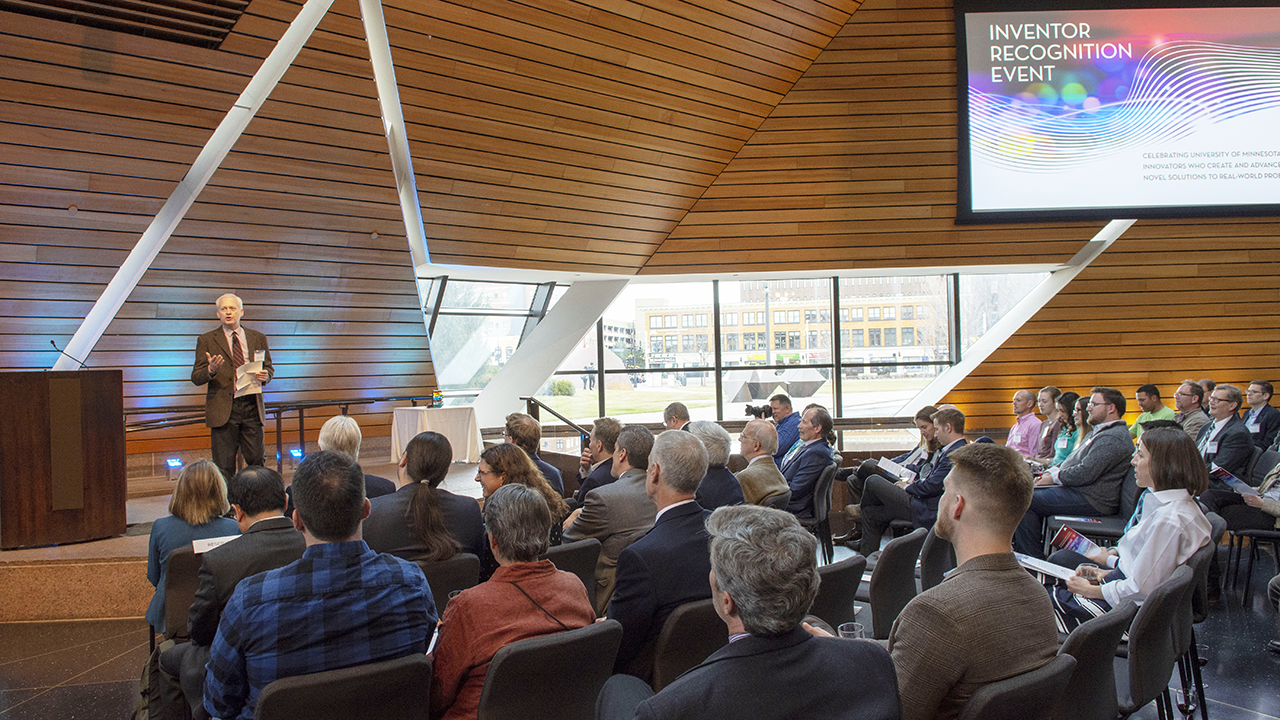
Earlier this week, the University of Minnesota celebrated its researchers’ recent breakthroughs and their efforts to bring these innovations beyond the lab.
The 2019 Inventor Recognition Event, hosted by the Office of the Vice President for Research and U of M Technology Commercialization at McNamara Alumni Center, recognized 455 University inventors whose technology had been licensed or patented between July 2016 and June 2018. During those two years, researchers submitted more than 800 disclosures of new inventions, and Technology Commercialization filed for more than 400 patents to protect the intellectual property behind some of these inventions.
"We are fortunate to have an academic community prolific not only in the generation of groundbreaking research outcomes, but also imbued with entrepreneurial spirit,” said Chris Cramer, Ph.D., the U’s vice president for research. “Their innovation and creativity leads to new technologies that, when connected with capital and entrepreneurial expertise—sometimes in partnership with existing companies—can bring these discoveries from the lab to the marketplace, with real potential to improve lives in meaningful ways.”
2019 Innovation Awards
During the Inventor Recognition Event, four Innovation Awards were given to recognize the accomplishments of outstanding University innovators who have demonstrated exceptional academic ingenuity and entrepreneurial drive in working to bring innovations beyond the lab.
Early Innovator Award
Recognizes a researcher who has been at the University for less than six years, has demonstrated an ambitious entrepreneurial spirit, and is actively engaged in developing new innovations and moving those technologies to the market.
Branden Moriarity, Ph.D., Medical School
Branden Moriarity harnesses the power of genome engineering, where scientists reprogram DNA, to develop innovative immunotherapy approaches for treating highly lethal forms of cancer. Moriarity’s work, combined with that of his colleagues, was the foundation for B-MoGen Biotechnologies Inc., a University startup company launched in 2016. He currently serves as B-MoGen’s chief scientific officer.
Entrepreneurial Researcher Award
Recognizes a researcher who shows an exemplary entrepreneurial spirit by their initiative to develop new technologies and move those technologies from the lab to the market.
Jian-Ping Wang, Ph.D., College of Science & Engineering
Jian-Ping Wang researches how the “spin” of an electron and its associated magnetism, rather than its charge, can be used as the basis for next-generation computing technologies that are faster, smaller and more energy-efficient. Among the results of Wang’s research are a new material and process for making magnets that could replace the expensive, environmentally harmful rare earth metals currently used to construct wind turbines, hybrid/electric vehicles, hard disk drives and generators (the basis for University startup Niron Magnetics), as well as a portable device that quickly and accurately screens patients for early signs of a variety of disease and health conditions (the basis for startup Zepto Life Technology).
Impact Award
Recognizes a researcher whose innovation has most positively and most broadly impacted global society and improved quality of life.
Jim Luby, Ph.D., and David Bedford, College of Food, Agricultural and Natural Resource Sciences
Jim Luby and David Bedford’s extensive contributions to the University’s apple breeding program have resulted in new apple varieties with improved texture and flavor, as well as an improved ability to maintain quality while in storage. Their research led to the introduction of the world-renowned Honeycrisp apple. Most recently, Luby and Bedford released First Kiss, (known as Rave when grown outside of Minnesota), an apple with a crisp texture, spritely flavor and early harvest date.
Committee’s Choice Award
Recognizes an outstanding researcher or group nominated in any category who has developed a successful innovation and brought it to market, including those that did not require patenting.
Kenneth Beckman, Ph.D., U of M Genomics Center; Daryl Gohl, Ph.D., U of M Genomics Center; Dan Knights, Ph.D., College of Science and Engineering
Kenneth Beckman, Daryl Gohl, and Dan Knights are the inventors behind CoreBiome, a University startup launched in 2017 that analyzes communities of microbes for human health, agricultural and environmental applications. Their suite of technologies enable microbiome analysis with unprecedented speed, reproducibility and accuracy, allowing their customers to harness big data to create breakthrough products and therapies. The startup was acquired by OraSure Technologies Inc. in 2019.
See the winners of previous years’ Innovation Awards.